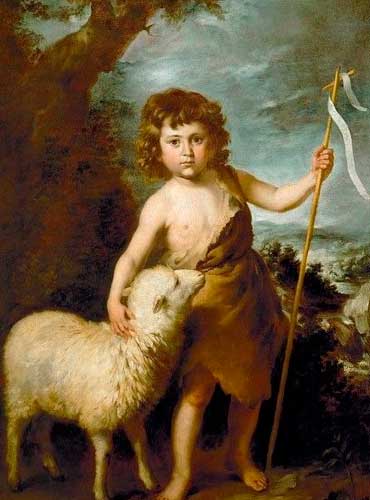Nativity of Saint John the Baptist – June 24th – Option 2 – Lk 1: 57-66, 80
It might come as sort of a surprise, but one of the symbols in art associated with Saint Ambrose is a beehive; sometimes you’ll see a beehive at his feet, and he is in fact the patron saint of beekeepers. That patronage stretches back to Ambrose’s childhood, when, according to tradition, as a child he fell asleep near a beehive and the bees began to swarm his face, even going in and out of his mouth. His parents were horrified, but knew that if they woke him, his reaction would certainly cause the bees to sting, and so they waited and prayed. At a certain point, the bees simply formed a swarm and left Ambrose in peace; his parents rushed to grab him, and having the child safe in their arms, his father is said to have replied, “This child will be something great . . . if he lives.”
Today we also celebrate a great man: Saint John the Baptist. In fact, Christ Himself calls him “the greatest of those born among women”: that’s no small compliment, and so the Church not only celebrates his birth into this world, which it does officially only for two other people, namely Jesus Himself and the Blessed Virgin Mary, but it also makes that day a solemnity.
In today’s Gospel, we heard that the neighbors of Zechariah and Elizabeth “took these things,” meaning, all of the events surrounding John’s birth, “to heart,” and, overcome with fear, asked themselves “What will this child be?” Clearly God’s hand is upon him, and the Most High has special plans for John, but their neighbors are afraid: for Aquinas, fear is the passion that results from the perception of a future evil. It’s not clear what they are afraid of, but apparently they think that God’s great designs for this child are something bad if they are to be feared. And yet, on the contrary, they aren’t to be feared: they are to be rejoiced over, because that seed of greatness that lies in John will come to full bloom as he identifies and proclaims the coming of the Lamb of God.
That seed of greatness, planted within us at our baptism, is entrusted to us as well, and in a particular way to those of us whom God has called to the religious life. To each of us, the question is posed: “What will this child be?” The greatness of holiness lies within our reach; it simply means to faithfully carry out our duties, to love what Christ loves, and continue along the path to heaven. This is not something to be feared, although sometimes it seems that God’s will and desires are not our own. However, if we let that fear prevent us from giving ourselves to God totally, we will be condemned to a life of mediocrity. If we embrace that call, however, and work with God, there are no limits to what He can do in us, as He did in John.
As we celebrate this solemnity of the birth of John the Baptist, let us ask, through his intercession and that of Mary, Mother of all the Redeemed, for the grace to imitate John in his magnanimity by surrendering ourselves entirely to God’s will at every moment of our lives.






